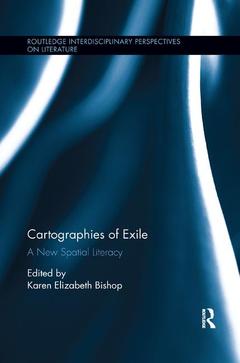Cartographies of Exile A New Spatial Literacy Routledge Interdisciplinary Perspectives on Literature Series
Coordonnateur : Bishop Karen Elizabeth

This book proposes a fundamental relationship between exile and mapping. It seeks to understand the cartographic imperative inherent in the exilic condition, the exilic impulses fundamental to mapping, and the varied forms of description proper to both. The vital intimacy of the relationship between exile and mapping compels a new spatial literacy that requires the cultivation of localized, dynamic reading practices attuned to the complexities of understanding space as text and texts as spatial artifacts. The collection asks: what kinds of maps do exiles make? How are they conceived, drawn, read? Are they private maps or can they be shaped collectively? What is their relationship to memory and history? How do maps provide for new ways of imagining the fractured experience of exile and offer up both new strategies for reading displacement and new displaced reading strategies? Where does exilic mapping fit into a history of cartography, particularly within the twentieth-century spatial turn?
The original work that makes up this interdisciplinary collection presents a varied look at cartographic strategies employed in writing, art, and film from the pre-Contact Americas to the Renaissance to late postmodernism; the effects of exile, in its many manifestations, on cartographic textual systems, ways of seeing, and forms of reading; the challenges of traversing and mapping unstable landscapes and restrictive social and political networks; and the felicities and difficulties of both giving into the map and attempting to escape the map that provides for exile in the first place.
Cartographies of Exile will be of interest to students and scholars working in literary and cultural studies; gender, sexuality, and race studies; anthropology; art history and architecture; film, performance, visual studies; and the fine arts.
Introduction: The Cartographical Necessity of Exile Karen Elizabeth Bishop Part I: Exilic Textualities 1 A Cartography of the Uncertain: The Maya Textual Exile Nathan C. Henne 2 A Cartography of Exile: Du Bellay’s France, mere des arts Tom Conley 3 Handprints: The Cartographic Vision of Mirta Kupferminc Amy Kaminsky Part II Geographies of Displacement 4 Traverse, Territory and the Ecological Uncanny: James Rennell and the Mapping of the Gangetic Plains Swati Chattopadhyay 5 Shackle, Sycamore, Shibboleth: Material Geographies of the Underground Railroad Tom Nurmi 6 Isabella Stewart Gardner’s "Barbarous Barbaro": Fenway Court as Exilic Map and Liberation Cartography Paul Fisher Part III Lyric Exile 7 Cold War Exile and the Longing for Non-State Refuge: John Ashbery’s American School in Paris Richard Cole 8 Lost Between Past and Future: Mario Benedetti’s Geography of Return Frans Weiser Part IV Escaping the Map 9 Stateless Cartography in Eric Ambler’s Novels: Escape Routes at the Edges of Legality Christian B. Long 10 Art of the Invisible: Drone Warfare, Rendition, and the Black Sites of Justice Georgiana Banita 11 Looking for Loopholes: The Cartography of Escape Emma Cocker Coda: The Cartographic Ethics of Exile Karen Elizabeth Bishop
Karen Elizabeth Bishop is Assistant Professor of Spanish and Comparative Literature at Rutgers University, New Brunswick, USA. Selected publications include work in the Journal of Modern Literature, the Journal of Transnational American Studies, Translation Review, and the Journal of the Society of Architectural Historians.
Date de parution : 12-2019
15.2x22.9 cm
Date de parution : 05-2016
15.2x22.9 cm
Thèmes de Cartographies of Exile :
Mots-clés :
cartography; exile; mapping; diaspora; expatriation; migration; refugees; nomads; map-making; Karen Elizabeth Bishop; memory; space; place; political imaginaries; historical imaginaries; virtual maps; epistemological displacement; cartographic strategies; interpretation; cultural history; isolation; literary geography; geography; cartographies; spatiality; UK Social System; art; Young Men; Creech Air Force Base; Alessandro Vellutello; Omer Fast; National Library; Tomas Venclova; West Germany; Nineteenth Century Latin America; Fenway Court; Rajmahal Hills; Cartographic Imperative; Du Bellay; Rennell’s Maps; Dirty Story; Liber Insularum Archipelagi; Exile Functions; Black Sites; Bird’s Eye; Stateless People; Corporate Exploitation; American Sycamore; Rue De Fleurus; Contemporary Society; Drone Warfare



